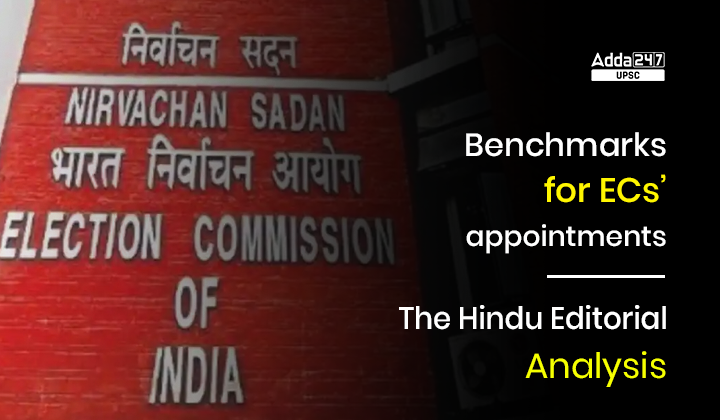Table of Contents
Election Commission (EC)’s Appointment in News
- Various aspects regarding Election Commission (EC) has come to public discourse because of the hearings in the Supreme Court on the appointment of Election Commissioners (ECs).
Constitutional & Legal Provision Regarding EC
- Article 324 of the Constitution is the fountainhead that creates the ECI. This brings to mind the larger issue of the working of the Constitution.
- The Election Commission (Conditions of Service of Election Commissioners and Transaction of Business) Act, 1991 also governs the working and functioning of the Election Commission of India (ECI).
- For this, it is worth recalling what two stalwarts of Constitution-making (the President of the Constituent Assembly (CA) and the Chairman of the Drafting Committee for the Constitution) said in their final speeches in the CA when the Constitution was finally adopted.
Views of Constitution Makers on EC
- B.R. Ambedkar said, “However good a Constitution may be, it is sure to turn out bad because those who are called to work it, happen to be a bad lot. However bad a Constitution may be, it may turn out to be good if those who are called to work it, happen to be a good lot. The working of a Constitution does not depend wholly upon the nature of the Constitution.”
- Rajendra Prasad said, “Whatever the Constitution may or may not provide, the welfare of the country will depend upon the way in which the country is administered. That will depend upon the men who administer it… If the people who are elected are capable and men of character and integrity, they would be able to make the best even of a defective Constitution. If they are lacking in these, the Constitution cannot help the country. After all, a Constitution, like a machine, is a lifeless thing. It acquires life because of the men who control it and operate it, and India needs today nothing more than a set of honest men who will have the interest of the country before them.”
- If we take the above-mentioned views of the two luminaries as a guide for choosing who should be assigned the task of ensuring that the roots of democracy are kept appropriately watered and nourished, the answer is Election Commissioners (ECs).
Elevation of EC to CEC
- One major weakness in the system(s) of appointments of the ECs proposed so far is that they all perpetuate the bureaucratisation of the ECI, which is not even hinted at in the Constitution anywhere.
- Two visible manifestations of this are the so-called elevation of ECs to Chief Election Commissioner (CEC), and the tenures of ECs and CEC.
- The elevation is a clear violation of the principle of primus inter pares. Monopolisation of the positions of ECs and CEC by the administrative services is too obvious to need highlighting.
Way Forward
Following process is proposed to ensure better functioning the ECI-
- An existing committee of Parliament or a new committee formed for this purpose should propose the qualifications and requirements for persons to be appointed as ECs/CEC.
- The proposals of the committee should be put to Parliament and should be considered approved only if they are approved by two-thirds majority of the members of Parliament present and voting.
- Once the qualifications and requirements have been approved by Parliament, the same committee should be entrusted with the task of searching for and selecting individuals proposed to be appointed as ECs/CEC.
- The committee should invite nominations and applications of individuals appropriate for or interested in being appointed as ECs/CEC.
- The committee should send its recommendations to Parliament for consideration.
- Recommendations of the committee should be considered approved by Parliament only if approved by two-thirds majority of the members of Parliament present and voting.
- Once Parliament approves the recommendations, they should be sent to the President for approving the appointments.
- Once appointed, such persons should stay in their positions for six years or the age of 75 years, whichever is earlier.
- Persons above the age of 69 years should not be appointed.
Conclusion
- While many issues related with the ECI have been discussed in court hearings and outside, a deeper look at the ECI may be useful, given its role in the preservation of democracy in the country.
- If the democracy in its real sense is to be preserved in the country, the importance of the ECI has to be recognised and accepted.
The Hindu Editorial Analysis: Autonomy of the Election Commission
The Hindu Editorial Analysis: Autonomy of the Election Commission




 TSPSC Group 1 Question Paper 2024, Downl...
TSPSC Group 1 Question Paper 2024, Downl...
 TSPSC Group 1 Answer key 2024 Out, Downl...
TSPSC Group 1 Answer key 2024 Out, Downl...
 UPSC Prelims 2024 Question Paper, Downlo...
UPSC Prelims 2024 Question Paper, Downlo...





